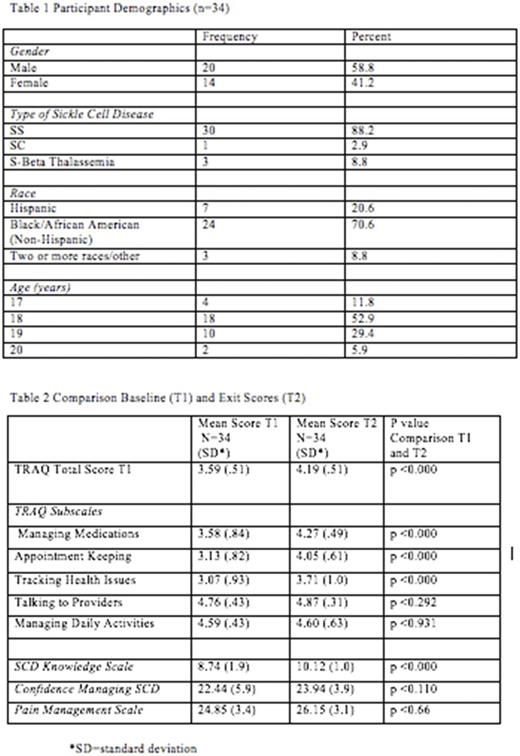Abstract
Introduction:
Transition to adult care is a high-risk period with increased health care utilization and death in Sickle Cell Disease (SCD) patients (Brousseau 2010, Hemker BG 2011, Paulukonis ST 2016), as in other chronic illnesses. Lack of transition planning may result in poor quality of care; low patient satisfaction; and avoidable morbidity, ED visits, hospitalizations and mortality. The American Academy of Pediatrics (AAP), American Academy of Family Physicians (AAFP) and American College of Physicians (ACP) issued joint recommendations describing steps to assure effective transition, however, few pediatric hematology practices follow these recommendations. Use of a dedicated transition navigator (TN) from pediatric to adult care has been successful in other chronic illnesses such as congenital heart disease and diabetes. (Mackie 2016) We report on changes in transition readiness following an intensive TN intervention delivered to youth 17-20 years old over a period of 6-12 months at an urban academic medical center.
Methods:
We developed and implemented a protocolized intervention for young adults with SCD, aged 17-20 years, delivered by a trained TN with 5 goals: (1) an individualized transition plan; (2) a portable medical summary (Transition Passport); (3) improve patient knowledge and skills for self-management of SCD to address quality of care, adherence, and proper use of the ED; (4) address family members' roles in transition; and (5) facilitate transfer to an adult provider. Youth completed self-administered surveys at enrollment and program completion including the 20-item Transition Readiness Assessment Questionnaire (TRAQ) and measures of SCD knowledge, confidence in disease management, and use of an appropriate pain management plan. Pre/post scores were compared using paired t-tests. Satisfaction with the TN intervention was assessed at program completion.
Results:
36 youth were approached and only 2 refused participation. Of the 34 participates, 58.8% were male and by 88.2% had SS disease, 70.6% were Black/African American and all were between 17-20 years old (Table 1). The majority met with the TN >4 or more times (88%) and 74% had been working with the transition navigator ³ 6 months.
Pre/post scores are shown in Table 2. There was significant improvement in total TRAQ scores and 3 of 5 subscales. The two that did not show significant change were already higher at baseline. SCD knowledge also improved significantly as measured by an 11 part questionnaire assessing various knowledge domains. In addition to the SCD knowledge questionnaire, we assessed patient's self-identification of SCD genotype at baseline and at exit. At enrollment 27/34 (79%) knew this correctly, with 3 giving wrong answers and 4 saying "don't know". At exit 33/34 (97%) correctly reported their genotype, of the 7 that did not report genotype correctly at enrollment, 6 were able to identify the correct genotype at exit and one selected "SC" instead of SS at both times. Both confidence and pain management scales also increased, although not significantly.
Youth expressed high level of satisfaction with the program. 100% of the participants stated that the TN had explained the transition program, they understood the program content and had sufficient time to ask questions at the sessions. Of the 94% that responded to the query, all stated that they preferred to stay within the current hospital system.
Conclusion:
A TN program is acceptable to youth with SCD and feasible to implement at an urban academic medical center. Our data demonstrate that participation in the TN program is associated with improved transition readiness and disease knowledge for youth with SCD. Further study is needed to determine if this intervention improves transfer to adult care and reduces morbidity.
No relevant conflicts of interest to declare.
Author notes
Asterisk with author names denotes non-ASH members.


This feature is available to Subscribers Only
Sign In or Create an Account Close Modal